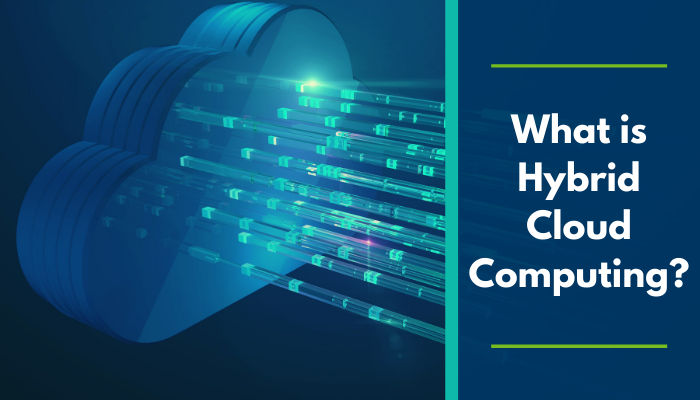Cloud Computing Hybrid- You might wonder and ask why?
Most businesses want to enjoy the privacy that comes with private cloud computing, as it allows them to store their sensitive information on-premises.
Likewise, they want to enjoy the scalability provided by public cloud solutions, which gives their businesses greater flexibility to scale up or down their capacity when the need arises.
Choosing either private or public cloud infrastructures alone can not provide all these services. As a result, more businesses opt for a hybrid cloud solution – an intermediate between them.
This article will further discuss hybrid cloud computing, its benefits, and the disadvantages of using it.
What Is Hybrid Cloud Computing?
Hybrid Cloud Computing, as the name implies, refers to a mixed or combined cloud computing environment that comprises private (on-premises) and public (off-premises) cloud services and allows data communications between the cloud solutions.
Previously, private clouds were run solely on-premises and were not shared between entities, while public clouds were run on public data centers and off-premises of the organization. However, with hybrid cloud computing, some businesses now run their public clouds on-site and build private clouds off-site.
The hybrid cloud approach allows businesses to store their crucial workloads on the private cloud and less sensitive ones on the public cloud. Also, it allows for smooth workload migration between the two environments, thereby providing better flexibility, agility, and scalability.
What Are The Benefits Of Hybrid Cloud Computing?
Cloud Computing Hybrid offer tons of benefits over private and public clouds.
Here are a few:
Increased Flexibility
To beat your competitors, you need the ability to respond to changes in your business demands as fast as possible. Else, your competitors will always be at an advantage.
A major benefit of hybrid clouds is the increased flexibility it provides, which allows organizations to alter their cloud solutions quickly and effectively, according to their current demands. Thus, they aren’t limited to private cloud solutions alone and can expand their operational capacity to accommodate their increasing workload.
Although private cloud solutions offer better privacy, public clouds are often less expensive, easier to maintain, and give more room for a business to expand its coast.
However, you can enjoy the best of both solutions with hybrid clouds.
Hybrid clouds will provide the public cloud computing resources you need during your business peak times and run applications requiring multiple servers. It will also provide your business with private cloud solutions for storing critical data and operations.
Cost Savings
Do you know that adopting hybrid cloud computing in your business can save you thousands of dollars?
No doubts, high operational cost is one of the disadvantages of private cloud services. Businesses that use on-premises cloud infrastructure often need to purchase more servers during times of excess demand.
Sadly, they might require less during their normal demand periods but would need to invest extra cash to purchase more servers during their peak usage times. You will agree that this is an unnecessary operational cost.
However, with hybrid cloud computing, businesses can purchase only the required number of servers during their normal demand periods and rely on public cloud services when in excess demand. Thus, they can cut down their operational costs and invest in more profitable business areas.
Improved Data Security
Hybrid cloud computing offers businesses greater freedom to decide where to secure their data, depending on their security requirements and regulatory compliance.
As a result, these organizations have better control over their data and can secure it from being exposed to cybercriminals. Businesses can choose to store their important and sensitive information in data centers on-site and use the public clouds for less sensitive information.
Compliance to Regulatory Bodies
Hybrid cloud computing is the best option for companies with highly sensitive information such as banks, hospitals, government agencies, etc. This is because they are regulated by certain standards that require that they store more sensitive data on-premises and others off-premises.
Hybrid clouds allow them to meet the requirements of the regulatory bodies while enjoying the scalability that comes with public cloud services.
Reduced Risk
Hybrid clouds offer many security measures that private cloud users enjoy and even more.
Most organizations would not risk exposing their data to cybercriminals on public clouds because of its openness. As a result, hybrid clouds are better alternatives that ensures that private data remains as secure as possible.
Increased Control
Another reason many companies are adopting hybrid cloud computing is to exert control over their IT infrastructure.
Most organizations are reluctant to entrust all their IT assets to a third-party cloud services provider. Instead, they prefer to have direct control over their infrastructure to make necessary adjustments and configurations when the need arises.
With hybrid cloud models, businesses can achieve this and can customize the private aspect of the hybrid clouds to suit their needs. In addition, their IT staff can manage their infrastructures servers and oversee important operations.
Business Continuity and Disaster Recovery
During disasters, businesses without a proper Business Continuity and Disaster Recovery (BCDR) strategy will suffer huge losses. They will experience a prolonged downtime and might shut down their normal operations for a long time.
A proper BCDR strategy ensures minimal downtime or delay following a disastrous event. A major part of business continuity is hybrid cloud computing. It helps organizations back up their critical data to the cloud to have an alternative to fall back to when there’s a disruption in the on-premises data centers.
What Are The Cons of Hybrid Cloud Computing?
Despite the tons of benefits that hybrid cloud users enjoy, there are certain disadvantages to consider:
Hardware Expenses
Although hybrid clouds are relatively cheaper than private clouds, they still require additional hardware costs. Specific hardware is required to deploy and maintain the private aspect of the hybrid clouds. The cost of this initial deployment and installation is quite high compared to public cloud services.
Cloud Compatibility
Cloud compatibility is also a concern for a hybrid cloud environment. For example, the on-premises cloud infrastructure might perform faster than the public cloud model. When this happens, there is no coherence, which can severely affect the overall hybrid cloud model.
Poor Visibility
Adopting a single cloud environment is complex, and using multiple cloud environments is even much more complicated. It becomes hard to have a clear overview of the overall cloud model – the processes, systems, applications, requirements, etc. The lack of understanding of the cloud architecture makes it difficult to track critical issues and meet the regulatory standards.

